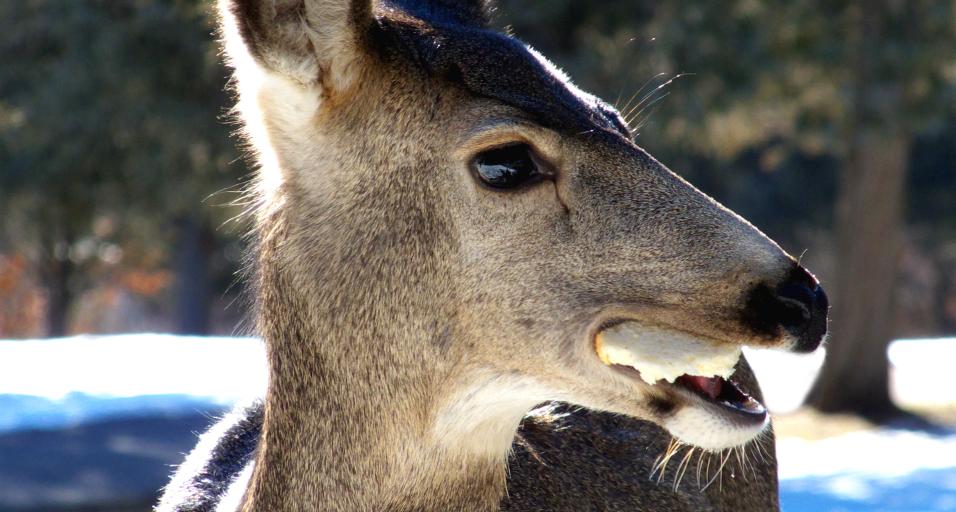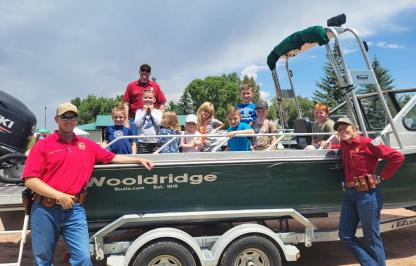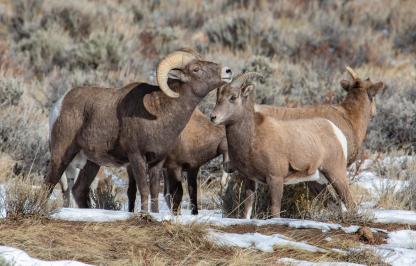Keep our mule deer wild - why feeding is bad
Please don’t feed the mule deer. Due to the severe winter conditions in many parts of the Lander Region, the Wyoming Game and Fish Department is informing people that there will be significant losses of wildlife this year. While the Game and Fish, in other parts of the state, has initiated emergency elk feeding this year in response to damage to stored hay and co-mingling with livestock, the feeding of other wildlife, especially mule deer, should not be done.
Each winter, well-intentioned people begin to feed wildlife, under the assumption it will ensure their survival through winter. Unfortunately, feeding of any kind causes more harm than good to mule deer and only furthers their decline. Mule deer are adapted to their environment and specifically to the plants they rely on to survive. Throughout the summer they eat highly nutritious plants to build up their fat stores. Through the winter they eat less overall and transition to eating woody plants that are less nutritious while they utilize their fat stores for energy and survival.
Unlike elk, mule deer are highly selective foragers due to their specialized digestive system. Mule deer digestive systems contain specific bacteria that help break down only the plants they eat and are adapted to. The bacteria adjust slowly to match their diet through each season, and in the winter their gut contains the appropriate bacteria to digest only their winter diet of woody materials. Any human-provided food sources, including hay, apples, corn, and etc. are simply not digestible and cause an abundance of lactic acid, acidosis, dehydration, and ultimately death. Fed mule deer often die from starvation with full stomachs of food they can not digest.
“We recognize that in some parts of the state, we are losing more deer (and antelope) during this heavy winter. It is natural for some of the deer, especially fawns and weaker adults, to die each winter and this ultimately strengthens the population as a whole. Food provided by humans will only make this winter worse for them. Your good intentions providing food to wintering wildlife may ease your own heart and mind but the reality is that it is causing an added amount of harm,” says Lander Region Wildlife Management Coordinator Daryl Lutz
“I know many folks are having a hard time watching the deer in town struggle, and with the best of intentions are feeding deer unaware that it's causing more problems than helping. I have pulled a half dozen dead deer out of haystacks this winter with bellies full of hay and no fat on their backs,” says Lander Game Warden Rob Shipe.
The Wyoming Game and Fish Department recognizes and appreciates people’s concern about wintering wildlife. As you watch wildlife this winter, please do not feed them because you are doing more harm than good. Virtually all wild animal populations experience year-to-year fluctuations. Certainly, this is a difficult winter for wildlife and for the people who enjoy them.
For more information, please visit the Keep Your Mule Deer Wild Game and Fish webpage or call Daryl Lutz at 307-332-2688.
Photo captions: Top: Mule deer eating bread fed from humans. Bottom: Mule deer that died from ingesting hay.
Another great resource that explains what happens when mule deer are fed is: https://fwp.mt.gov/binaries/content/assets/fwp/montana-outdoors/2022/winterfeeding.pdf
Each winter, well-intentioned people begin to feed wildlife, under the assumption it will ensure their survival through winter. Unfortunately, feeding of any kind causes more harm than good to mule deer and only furthers their decline. Mule deer are adapted to their environment and specifically to the plants they rely on to survive. Throughout the summer they eat highly nutritious plants to build up their fat stores. Through the winter they eat less overall and transition to eating woody plants that are less nutritious while they utilize their fat stores for energy and survival.
Unlike elk, mule deer are highly selective foragers due to their specialized digestive system. Mule deer digestive systems contain specific bacteria that help break down only the plants they eat and are adapted to. The bacteria adjust slowly to match their diet through each season, and in the winter their gut contains the appropriate bacteria to digest only their winter diet of woody materials. Any human-provided food sources, including hay, apples, corn, and etc. are simply not digestible and cause an abundance of lactic acid, acidosis, dehydration, and ultimately death. Fed mule deer often die from starvation with full stomachs of food they can not digest.
“We recognize that in some parts of the state, we are losing more deer (and antelope) during this heavy winter. It is natural for some of the deer, especially fawns and weaker adults, to die each winter and this ultimately strengthens the population as a whole. Food provided by humans will only make this winter worse for them. Your good intentions providing food to wintering wildlife may ease your own heart and mind but the reality is that it is causing an added amount of harm,” says Lander Region Wildlife Management Coordinator Daryl Lutz
“I know many folks are having a hard time watching the deer in town struggle, and with the best of intentions are feeding deer unaware that it's causing more problems than helping. I have pulled a half dozen dead deer out of haystacks this winter with bellies full of hay and no fat on their backs,” says Lander Game Warden Rob Shipe.
The Wyoming Game and Fish Department recognizes and appreciates people’s concern about wintering wildlife. As you watch wildlife this winter, please do not feed them because you are doing more harm than good. Virtually all wild animal populations experience year-to-year fluctuations. Certainly, this is a difficult winter for wildlife and for the people who enjoy them.
For more information, please visit the Keep Your Mule Deer Wild Game and Fish webpage or call Daryl Lutz at 307-332-2688.
Photo captions: Top: Mule deer eating bread fed from humans. Bottom: Mule deer that died from ingesting hay.
Another great resource that explains what happens when mule deer are fed is: https://fwp.mt.gov/
Daryl Lutz 307-332-2688



